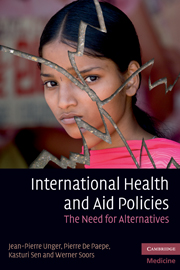Book contents
- Frontmatter
- Contents
- Preface
- Biographies
- Notices
- Acknowledgements
- List of abbreviations
- Reviews
- Introduction: Overview and purpose
- Section 1 Paradigms of international policies
- Section 2 The failure of the aid paradigm: poor disease control in developing countries
- Section 3 Impact of international health policies on access to health in middle-income countries: some experiences from Latin America
- Section 4 Determinants and implications of new liberal health policies: the case of India, China and Lebanon
- Section 5 Principles for alternative, publicly oriented health care policies, planning, management and delivery
- Section 6 A public health, strategic toolkit to implement these alternatives
- 17 Person-centred care: a key to strengthening health care and systems in low- and middle-income countries?
- 18 Improving access
- 19 Improving clinical decision making
- 20 Reorienting academic missions: how can public health departments and public health teaching in particular best support access to good quality comprehensive health care?
- Conclusions
- Glossary
- Index
- References
20 - Reorienting academic missions: how can public health departments and public health teaching in particular best support access to good quality comprehensive health care?
Published online by Cambridge University Press: 06 December 2010
- Frontmatter
- Contents
- Preface
- Biographies
- Notices
- Acknowledgements
- List of abbreviations
- Reviews
- Introduction: Overview and purpose
- Section 1 Paradigms of international policies
- Section 2 The failure of the aid paradigm: poor disease control in developing countries
- Section 3 Impact of international health policies on access to health in middle-income countries: some experiences from Latin America
- Section 4 Determinants and implications of new liberal health policies: the case of India, China and Lebanon
- Section 5 Principles for alternative, publicly oriented health care policies, planning, management and delivery
- Section 6 A public health, strategic toolkit to implement these alternatives
- 17 Person-centred care: a key to strengthening health care and systems in low- and middle-income countries?
- 18 Improving access
- 19 Improving clinical decision making
- 20 Reorienting academic missions: how can public health departments and public health teaching in particular best support access to good quality comprehensive health care?
- Conclusions
- Glossary
- Index
- References
Summary
Adapted from: Jean-Pierre Unger, Patrick Van Dessel. Teaching and training of health professionals. Health and Development. July 2009, special issue. ‘Equal opportunities for health: Action for development.’ Conference. CUAMM, Padova, June 2009–06–16A: 50–55.
Introduction
Improving the autonomy of LMIC health sectors from donor dependence and influence requires not only sufficient government financing, but also the broadening and transfer of knowledge within these countries. The managerial skills to run publicly oriented services and the conceptual framework needed by them to assess health policies were the subject of Sections 5 and 6. In Chapter 19 we explored some techniques of knowledge transfer from hospitals to health centres and vice-versa. In this final chapter of this section we examine how academic and public health departments can best contribute to the break from commercially motivated health policies, in preparing health professionals in publicly oriented services to improve access to comprehensive care.
Schools of public health, especially those concerned with LMIC, rarely treat health care delivery and medicine as a priority domain of study. Rather, they tend to concentrate on disease control and focus on policies related to this, and therefore teach in the main epidemiology, demography, statistics, and management of disease-specific programmes and their resources.
This is no mean paradox, since recent studies show that access to comprehensive care is probably the most important determinant of health. For instance, among women in Poland, up to 80% of premature deaths were related to conditions amenable to medical care (Nolte et al., 2002).
- Type
- Chapter
- Information
- International Health and Aid PoliciesThe Need for Alternatives, pp. 240 - 246Publisher: Cambridge University PressPrint publication year: 2010

